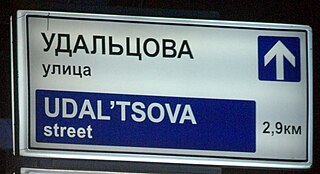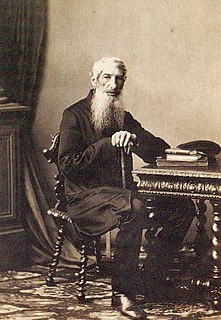
Nikolay Alexeyevich Nekrasov was a Russian poet, writer, critic and publisher, whose deeply compassionate poems about peasant Russia made him the hero of liberal and radical circles of Russian intelligentsia, as represented by Vissarion Belinsky, Nikolay Chernyshevsky and Fyodor Dostoyevsky. He is credited with introducing into Russian poetry ternary meters and the technique of dramatic monologue. As the editor of several literary journals, notably Sovremennik, Nekrasov was also singularly successful and influential.

Apollon Nikolayevich Maykov was a Russian poet, best known for his lyric verse showcasing images of Russian villages, nature, and history. His love for ancient Greece and Rome, which he studied for much of his life, is also reflected in his works. Maykov spent four years translating the epic The Tale of Igor's Campaign (1870) into modern Russian. He translated the folklore of Belarus, Greece, Serbia and Spain, as well as works by Heine, Adam Mickiewicz and Goethe, among others. Several of Maykov's poems were set to music by Russian composers, among them Rimsky-Korsakov and Tchaikovsky.

Konstantin Dmitriyevich Balmont was a Russian symbolist poet and translator. He was one of the major figures of the Silver Age of Russian Poetry.

Aleksey Nikolayevich Pleshcheyev was a radical Russian poet of the 19th century, once a member of the Petrashevsky Circle.

Sovremennik was a Russian literary, social and political magazine, published in Saint Petersburg in 1836-1866. It came out four times a year in 1836-1843 and once a month after that. The magazine published poetry, prose, critical, historical, ethnographic and other material.
Sainte-Geneviève-des-Bois Russian Cemetery is part of the Cimetière de Liers and is called the Russian Orthodox cemetery, in Sainte-Geneviève-des-Bois.
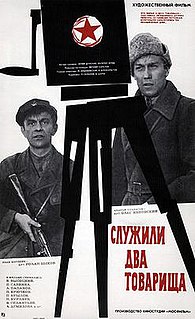
Two Comrades Were Serving is a 1968 Soviet war film directed by Yevgeny Karelov with a script by Yuli Dunsky and Valeri Frid. The film is about the Russian civil war, in particular, the battle for the Crimean peninsula.
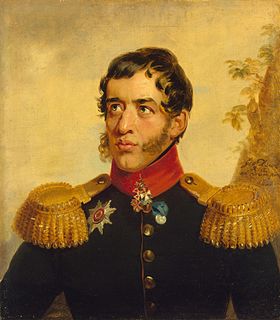
Prince Sergei Grigorievich Volkonsky was a Russian Major General and Decembrist from the aristocratic Volkonsky family.
3703 Volkonskaya, provisional designation 1978 PU3, is a Vestian asteroid and asynchronous binary system from the inner regions of the asteroid belt, approximately 4 kilometers (2.5 miles) in diameter. It was discovered on 9 August 1978, by Soviet astronomers Lyudmila Chernykh and Nikolai Chernykh at the Crimean Astrophysical Observatory in Nauchnij, on the Crimean peninsula. It was named by the discoverers after the Russian princess Mariya Volkonskaya. The V-type asteroid has a rotation period of 3.2 hours. The discovery of its 1.4-kilometer minor-planet moon was announced in December 2005.

Princess Maria Nikolaevna Volkonskaya was the youngest daughter of the Russian general Nikolay Raevsky and Sophia Konstantinova, granddaughter of Mikhail Lomonosov. In 1825 Maria married the future Decembrist Major General Prince Sergey Grigorievich Volkonsky. When Volkonsky was arrested and exiled to Siberia, she followed him into exile on the condition that her children born after her departure to Siberia would be forever struck from the noble estate and become bonded laborers ; the threat, however, was not put into practice.
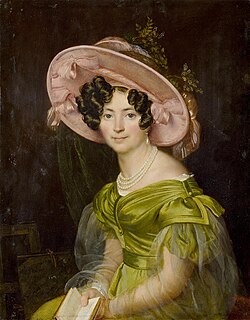
Princess Zinaida Aleksandrovna Volkonskaya, was a Russian writer, poet, singer, composer, salonist and lady in waiting.
Valentina Vasilievna Monakhova is a Soviet Russian painter, watercolorist, graphic artist, and art teacher, living and working in Saint Petersburg regarded as one of representatives of the Leningrad school of painting.
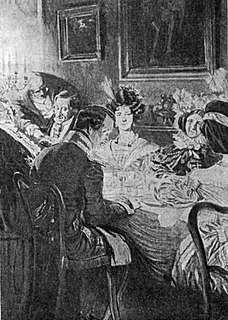
Princess Ligovskaya is an unfinished novel by Mikhail Lermontov started in 1836 and first published in No.1, January 1882 issue of Russky Vestnik.

Viktor Petrovich Burenin was a Russian literary and theatre critic, publicist, novelist, dramatist, translator and satirical poet notorious for his confrontational articles and satirical poems, mostly targeting leftist writers. He was the author of several popular plays, novels and opera librettos.
Who Is Happy in Russia? is an epic four-part poem by Nikolai Nekrasov, which he started publishing in January 1869, in Otechestvennye Zapiski. Part four of it, "The Feast for All the World" (1876-1877), remained unfinished.
Korobeiniki (Коробейники) is a poem by Nikolai Nekrasov first published in the October 1861 issue of Sovremennik magazine.
The Railway is a poem by Nikolai Nekrasov written in early 1864. Banned by censors in May and first published on November 24, 1865, in the October issue of Sovremennik, it is regarded as one of the most powerful anti-capitalist statements of 19th-century Russian literature.
Grandfather is a poem by Nikolai Nekrasov, written on 30 July - 8 August 1870 and first published in the September, No.9, 1870 issue of Otechestvennye Zapiski. It came out with a dedication to Zinaida Nikolayevna, Nekrasov's wife.
The Society of Russian Dramatists and Opera Composers was an organisation launched in 1874 in Moscow with a view to defending the rights of the authors of music and drama in Russia.

